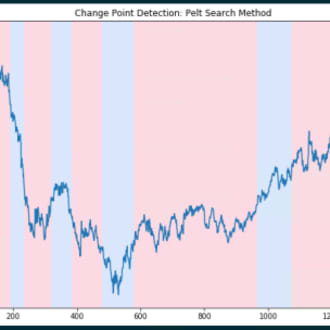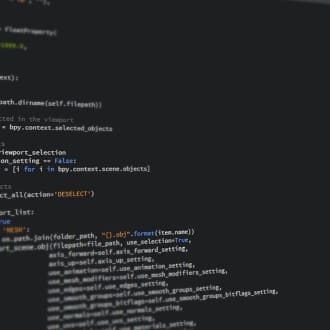
10+ Best Articles on Python
The most useful articles on python from around the web, curated by thought leaders and our community.
Refind focuses on timeless pieces and updates the list whenever new, must-read articles or videos are discovered.
Top 5 Python Articles
At a glance: these are the articles that have been most read, shared, and saved on python by Refind users in 2024 so far.
Videos
Watch a video to get a quick overview.
Guido van Rossum: Python and the Future of Programming
Guido van Rossum is the creator of Python programming language. Please support this podcast by checking out our sponsors:- GiveDirectly: https://givedirectly...
What is ...?
New to #python? These articles make an excellent introduction.
Introduction to Evolutionary Algorithms
A practical introduction on how to program Evolutionary Algorithms in Python to solve optimization tasks.
Machine Learning for Beginners: An Introduction to Neural Networks
A simple explanation of how they work and how to implement one from scratch in Python.
How to ...?
How to build a deep learning model in 15 minutes
An open source framework for configuring, building, deploying and maintaining deep learning models in Python.
How to build a simple time series dashboard in Python with Panel, Altair and a Jupyter Notebook
Two filters + one interactive area chart in roughly 25 lines of code.
How to build a scaleable crawler to crawl million pages with a single machine in just 2…
There are lots of articles about how to build a python crawler . If you are a newbie in python and not familiar with multiprocessing or…
How to build your own AlphaZero AI using Python and Keras
Teach a machine to learn Connect4 strategy through self-play and deep learning.
Short Articles
Short on time? Check out these useful short articles on python—all under 10 minutes.
9 One-Liners Anyone Learning Python Should Know
Make your Python code concise with these one-liners
The Origins of Python
Python is arguably the most popular programming language worldwide. Since its debut in 1991, Python’s accessibility and rich functionality has helped it gather a huge userbase. Its design was…
Multiprocessing in Python: The Complete Guide
The multiprocessing.Process class allows you to create and manage new child processes in Python. Although multiprocessing has been available since Python 2, it is not widely used, perhaps because o…
Top 12 Python Applications in the Real-World You Need to Know
Python programming can be the best option for developing certain applications, get to know them here along with some famous applications built using python
Python Libraries That One Must Try For Fun
So you want to make some projects for fun in python but do not know where to start. Well you can start from these libraries, which are very easy and very fun.
Long Articles
These are some of the most-read long-form articles on python.
Accelerate Python code 100x by import taichi as ti
Python has become the most popular language in many rapidly evolving sectors, such as deep learning and data sciences. Yet its easy readability comes at the cost of performance. Of course, we all…
Animating Regular Expressions With Python and Graphviz
Peering into the internals of a regex engine
Python’s “Disappointing” Superpowers
A response to Hillel Wayne’s “I am disappointed by dynamic typing”
Where does all the effort go? Looking at Python core developer activity
One of the tasks given me by the Python Software Foundation as part of the Developer in Residence job was to look at the state of CPython as an active software development project. What are people…
How I patched Python to include this great Ruby feature
Ruby, unlike Python, makes lots of things implicit, and there's a special kind of if expression that demonstrates this well. It's often referred to as an "inline-if" or "conditional modifier", and…
What is Refind?
Every day Refind picks the most relevant links from around the web for you. Picking only a handful of links means focusing on what’s relevant and useful.
How does Refind curate?
It’s a mix of human and algorithmic curation, following a number of steps:
- We monitor 10k+ sources and 1k+ thought leaders on hundreds of topics—publications, blogs, news sites, newsletters, Substack, Medium, Twitter, etc.
- In addition, our users save links from around the web using our Save buttons and our extensions.
- Our algorithm processes 100k+ new links every day and uses external signals to find the most relevant ones, focusing on timeless pieces.
- Our community of active users gets the most relevant links every day, tailored to their interests. They provide feedback via implicit and explicit signals: open, read, listen, share, mark as read, read later, «More/less like this», etc.
- Our algorithm uses these internal signals to refine the selection.
- In addition, we have expert curators who manually curate niche topics.
The result: lists of the best and most useful articles on hundreds of topics.
How does Refind detect «timeless» pieces?
We focus on pieces with long shelf-lives—not news. We determine «timelessness» via a number of metrics, for example, the consumption pattern of links over time.
How many sources does Refind monitor?
We monitor 10k+ content sources on hundreds of topics—publications, blogs, news sites, newsletters, Substack, Medium, Twitter, etc.
Can I submit a link?
Indirectly, by using Refind and saving links from outside (e.g., via our extensions).
How can I report a problem?
When you’re logged-in, you can flag any link via the «More» (...) menu. You can also report problems via email to hello@refind.com
Who uses Refind?
450k+ smart people start their day with Refind. To learn something new. To get inspired. To move forward. Our apps have a 4.9/5 rating.
Is Refind free?
Yes, it’s free!
How can I sign up?
Head over to our homepage and sign up by email or with your Twitter or Google account.
Keep Learning
Get the big picture on your favorite topics.

















